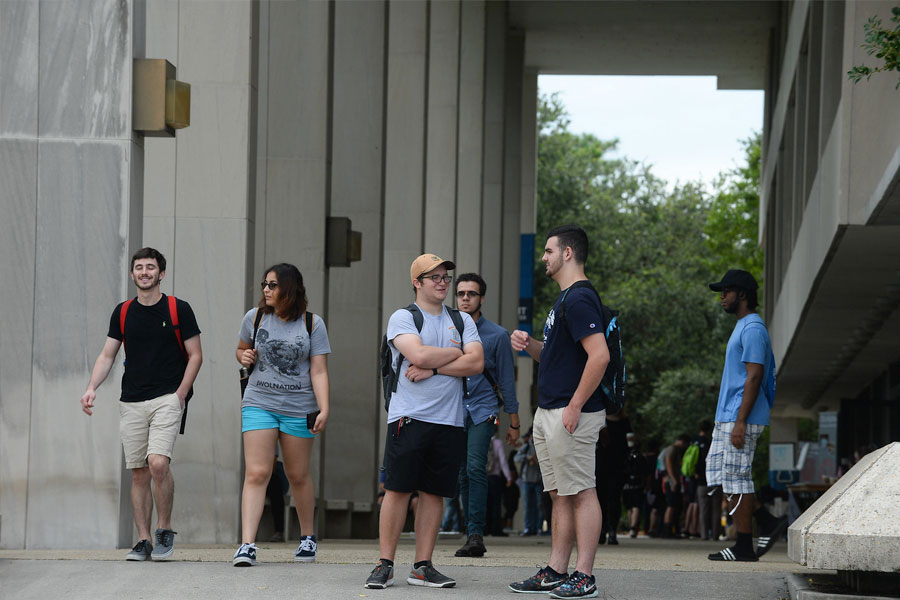Major and Minor Opportunities
B.A. in History
When you enroll in UNO’s Bachelor of Arts in history program, you’ll develop a foundational understanding of broad historical periods, and a more nuanced knowledge of the specific national, regional, or thematic topics you choose to specialize in. You’ll have the opportunity to deepen your passion for history, pursue the questions and narratives that energize you, and actively participate in historical research. The B.A. in history will leave you well equipped for a future career as a historian, an educator, an archivist, a museum curator, or any number of other paths.
The Bachelor of Arts in history is a 120-credit-hour program, including 39 general education credits, 45 other required credits, and 36 history-specific credits. At least six credit hours of history electives must have a geographical focus outside the United States.
Honors in History
To be admitted into the UNO Honors Program in history, incoming students must have a minimum ACT composite score of 30 or a minimum SAT score of 1350. For transfer or continuing students, the requirement is a 3.50 GPA or better. To graduate with a B.A. in history with honors, students must maintain a 3.50 GPA, complete six credit hours of History 3999, and successfully complete and defend their senior honors thesis.
Minor in History
Non-majors can earn a minor in history by completing 18 credit hours of history coursework with a 2.0 GPA or better. At least half of those credit hours must be in courses numbered 3000 or above.
Areas of Interest
You can tailor your B.A. in history to focus on any of these concentrations:

United States History
Trace and examine the development of the United States, from before European settlement through early exploration, expansion, and modern times.

Non-Western History
Challenge established narratives of history by studying a variety of non-Western cultural perspectives: African, Asian, Indian, Middle Eastern, and Latin American.

European History
Learn about the cultural, economic, political, and social developments that shaped Europe’s history—and, by extension, our larger world.
What You’ll Learn
The skills you’ll develop through the study of history are the practical, critical capabilities that are highly sought after in practically any career path. Evaluating evidence, sourcing reliable information, clearly communicating complex narratives, and understanding conflicting points of view are all essential to historical studies—and they’re also the skills that future employers are looking for.
In UNO’s Bachelor of Arts in history program, you will:
- Understand the discipline of history by interpreting primary source documents.
- Exhibit the skills necessary for historical analysis through written and oral narrative.
- Produce scholarly material by demonstrating the use of both primary and secondary sources.
When you complete your B.A. in history, you’ll have the skill set and foundational knowledge to excel in a graduate program, a career as a historian, or anywhere else life may take you.
Student Learning Outcomes
Student Learning Outcomes specify what students will know, be able to do, or be able to demonstrate when they have completed a program of study.
Research Opportunities
Research is a cornerstone of historical understanding, and we want you to have as many opportunities as possible to engage in original research while at UNO. Students working toward a B.A. in history can access our numerous historical research centers around campus, home to countless primary and secondary sources to guide your exploration.
You’ll also be able to participate in numerous types of hands-on or field research, including:
- Archaeological digs
- Archival work
- Internships with local cultural organizations
- Research assistance to professors
- Study abroad
Center Austria
The Center promotes connection and communication between universities in Austria and the University of New Orleans. Scholarly and artistic activities, as well as academic partnerships, allow for cultural exchanges between the U.S. and Central Europe.
Eisenhower Center for American Studies
The mission of the Eisenhower Center is to study the causes, conduct, and consequences of American national security policy, as well as the political use of force, in the twentieth century.
The Midlo Center for New Orleans Studies
The Ethel and Herman Midlo Center for New Orleans Studies is home to research material about New Orleans history, politics, culture, and public policy, particularly civil rights. The center sponsors and participates in events that bring scholars together to share their findings, including lectures, publications, performances, exhibits, and documentaries.
Hurricane Digital Memory Bank
This regional database collects stories, emails, oral histories, digital photos, audio, and video relating to Katrina, Rita, and Wilma. Special collections include photographs from the Smithsonian National Museum of American History, the Louisiana State Museum, and others.
Where Can You Work with a B.A. in History?
- Higher Education (M.A. or Ph.D.)
- Federal, State, and Local Government
- Museums
- Tourist Industry
- Teaching
- And more!
Sample Courses
- African-American History
- Environmental History
- European History
- History of New Orleans and New Orleans Music
- Military and Diplomatic History
- Survey of American History
- Survey of World History
- Urban History
- Women’s History
Why Study History in New Orleans?
Few cities in the country maintain such a close connection to their history as New Orleans does. When you work toward a B.A. in history at UNO, you’ll be immersed in a community that offers countless opportunities to explore history firsthand, and you’ll feel how it resonates through the present moment.
New Orleans is home to numerous major museums that offer our students research opportunities and internships, including the National WWII museum and multiple branches of the Louisiana State Museum. B.A. in history students frequently volunteer at city festivals and historical organizations, including the French Quarter Festival: the largest free festival in the South. And national and international conventions regularly pass through New Orleans, giving you the chance to meet with today’s leading historians, become part of the ever-evolving historical conversation, and even present your own work.
Faculty Spotlight
Gunter Bischof, Ph.D.
Specialization: 20th Century Diplomatic History
· American Historical Association’s George Louis Beer Prize recipient
· Member of European Academy of Sciences and Arts, Class I
· Gordon “Nick” Mueller International Leadership Medallion
· Cross for Science and the Arts, 1st Class
· Grand Cross of Austria
Allan Millett, Ph.D.
Specialization: 20th Century Wars and Military Policy
· National World War II Museum, Presidential Counselor
· Korea Foundation Distinguished Scholar
· Fulbright Distinguished Professor, Korea
· Doctorate Honoris Causa, Royal Military Academy, Belgium
· Pritzker Military Library Literature Award for Lifetime Achievement in Military Writing
· Secretary of Defense Distinguished Service Medal for Civilian Service
· First Vice President and Trustee, International Commission of Military History
Mary N. Mitchell, Ph.D.
Specialization: Early American History
· Author of Raising Freedom’s Child: Black Children and Visions of the Future after Slavery
· Member of Humanities Action Lab, Rutgers-Newark, 2015–Present
· Edward R. Murrow Regional Award recipient for Excellence in Journalism
· Fulbright Lectureship in American Studies, University of Innisbruck, Austria
· Constance Rourke Prize, American Studies Association
Phi Alpha Theta Honor Society
Phi Alpha Theta has been a premier national honor society for history for nearly 100 years. The society has a long, rich legacy at UNO—and you’re invited to be a part of it.
To apply to Phi Alpha Theta, you must have completed 12 credit hours of history courses, maintaining at least a 3.1 GPA in history and a 3.0 GPA overall. The society is open to all students, not just those pursuing a bachelor’s degree in history.
As a member of Phi Alpha Theta, you can participate in social and service activities with other students interested in history, while adding a mark of distinction to your resume. The society also publishes the journal Historian, which members have the opportunity to publish in. Finally, Phi Alpha Theta sponsors regional and national conferences where you can present your work—a major achievement as an undergraduate.
Questions about membership? Contact Robert Dupont, Ph.D. at rldupont@uno.edu.



